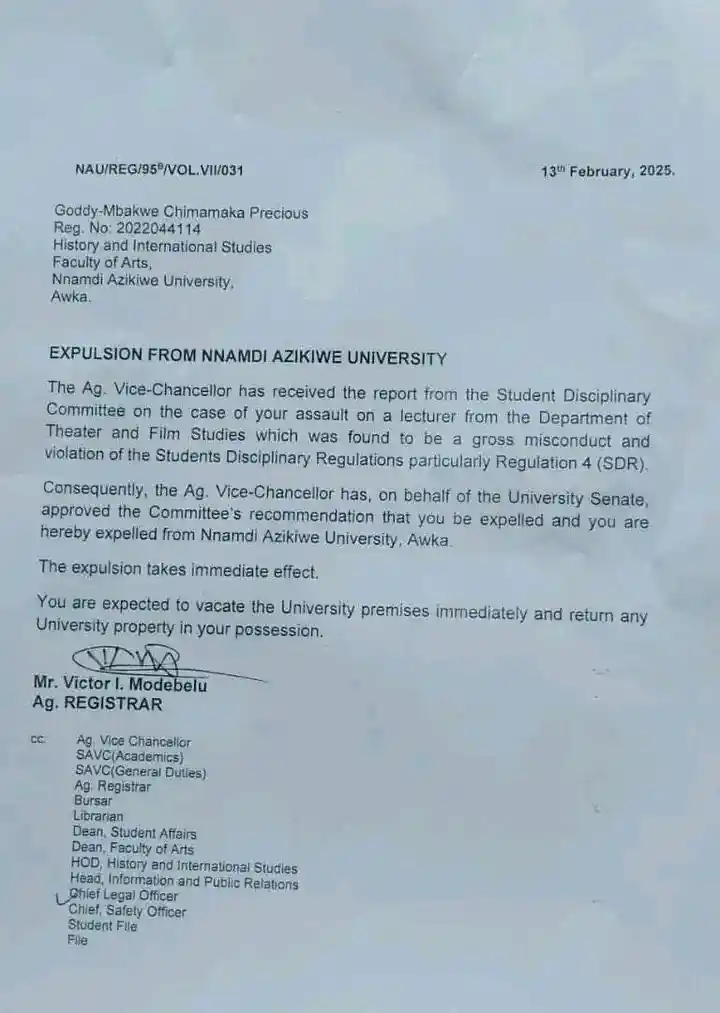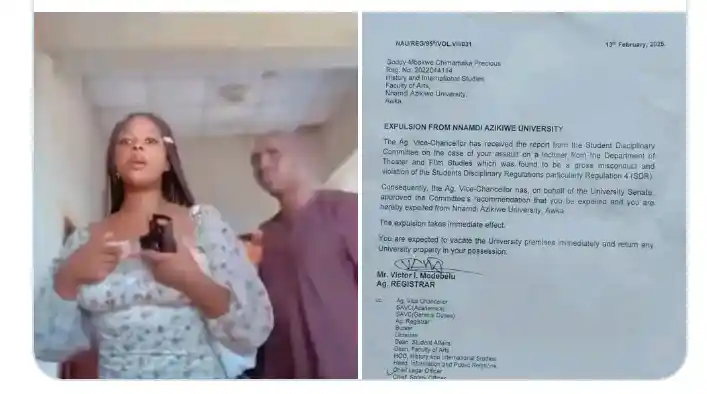Unizik Expels Female Student Over Lecturer Assault: Investigation Details and Implications
- Advertisement -
Nnamdi Azikiwe University (Unizik), Awka, has expelled Goddy-Mbakwe Chiamaka Precious, a student from the Department of History and International Studies, Faculty of Arts, following her involvement in a physical altercation with a lecturer from the Department of Theater and Film Studies. This decision was communicated in an expulsion letter issued on February 13, 2025, signed by the university’s acting Registrar, Mr. Victor I. Modebelu. The expulsion is effective immediately, underscoring the institution’s firm stance on student misconduct.
The Incident and Disciplinary Action
The letter stated that the assault was classified as gross misconduct under Regulation 4 of the university’s Student Disciplinary Regulations (SDR). According to the acting Registrar, the Student Disciplinary Committee conducted a comprehensive investigation into the incident before submitting its findings and recommendations to the acting Vice-Chancellor. Upon review, the acting Vice-Chancellor approved the recommendation of expulsion on behalf of the University Senate.
The letter also outlined the steps the student must take following her expulsion. She has been instructed to immediately vacate the university premises and return any property belonging to the institution that is in her possession. This action officially severs all academic and administrative ties between the student and the university.
- Advertisement -
Importance of Adhering to University Regulations
Unizik, like many higher institutions, has a strict code of conduct to ensure a peaceful and respectful learning environment. The university’s regulations explicitly prohibit acts of violence or misconduct between students, faculty, and staff. Such rules are critical in maintaining a culture of respect, discipline, and decorum in academic settings.
Regulation 4 of the university’s SDR—cited in the letter—outlines strict penalties for physical altercations or any other acts deemed disruptive to the learning process. The regulation emphasizes that students are expected to treat lecturers, administrative staff, and fellow students with the utmost respect. Any violation may lead to severe repercussions, ranging from suspension to expulsion, depending on the gravity of the offense.
This expulsion demonstrates that the university is committed to enforcing its rules without hesitation. By taking immediate disciplinary action, the institution has sent a clear message that misconduct, especially physical violence, will not be tolerated under any circumstances.
- Advertisement -

Transparency and Administrative Procedures
The university’s handling of this case reflects a commitment to procedural transparency. Copies of the expulsion letter were sent to key university officials, including:
- Acting Vice-Chancellor
- Dean of Student Affairs
- Dean of the Faculty of Arts
- Head of Department, History and International Studies
- Head of Information and Public Relations
- Chief Legal Officer
- Chief Safety Officer
By sharing the decision with multiple departments and administrative units, Unizik ensures that all relevant stakeholders are informed and prepared to enforce the decision. This multi-departmental approach also strengthens the university’s overall commitment to accountability and transparency in disciplinary matters.
- Advertisement -
Broader Implications for University Students and Faculty
This case serves as a cautionary tale for students across all higher institutions. Academic institutions are designed to foster learning, critical thinking, and innovation. Any behavior that disrupts this mission is considered a serious breach of trust. Furthermore, violent behavior undermines the integrity of academic communities and threatens the safety of students and staff.
The expulsion also highlights the need for students to be aware of and adhere to their institution’s rules and guidelines. Students often undergo orientation sessions at the start of their academic programs, where they are informed of the university’s expectations regarding behavior and discipline. Despite this, some incidents of misconduct still occur, emphasizing the importance of continuous education on proper conduct.
Conflict Resolution and Preventative Measures
While disciplinary measures are essential for maintaining order, some educational experts argue that institutions should also prioritize conflict resolution and preventative programs. In light of this case, there are discussions about expanding counseling and psychological support services at Unizik to address underlying issues that may lead to such confrontations.
The introduction of anger management and conflict resolution workshops could help equip students with the skills needed to de-escalate tense situations before they spiral out of control. Moreover, peer mediation programs—where trained students help resolve conflicts among their peers—could offer another avenue for managing disputes without resorting to violence.
Headies Award 2025 Nominees List: Date, Categories, and Top Contenders
- Advertisement -
It is also essential for institutions to foster a culture of respect and open communication. Ensuring that students feel heard and supported can help reduce feelings of frustration or resentment that may contribute to confrontational behavior.
Faculty Safety and Institutional Protection
The university’s decision to act swiftly in this case underscores its responsibility to protect faculty members from harm. Lecturers play a critical role in shaping students’ futures, and any form of violence or intimidation against them threatens the overall academic mission. Institutions must ensure that their faculty members feel safe and supported in their roles.
Unizik’s expulsion decision demonstrates a proactive stance on this issue. The clear and decisive response serves as a deterrent for any future incidents, reaffirming the university’s dedication to creating a safe academic environment for both staff and students.
Voices from the University Community
Reactions from the university community have been mixed but largely supportive of the decision. Many students and faculty members praised the administration for taking swift and decisive action.
A senior lecturer from the Faculty of Arts commented, “This sends a strong message that there is no place for violence at our institution. We hope this will deter any future incidents and ensure a respectful environment for all.”
Some students also expressed their views on the matter. “While the expulsion may seem harsh to some, it’s a necessary step to ensure that everyone feels safe in class. Respect is a two-way street, and violence is never the answer,” remarked one student from the Faculty of Social Sciences.
However, a few voices raised concerns about whether the university had done enough to prevent the incident in the first place. Some students suggested that the institution should introduce mandatory workshops on anger management and interpersonal communication for all students to prevent future altercations.
The Role of Counseling and Psychological Support
In response to the incident, there have been renewed calls for improved access to counseling and psychological services within the university. Emotional well-being is a critical factor in maintaining discipline and respect on campus. Many students face significant stress and anxiety related to academics, finances, and personal issues. Without proper support, these stressors can escalate into confrontations.
Experts suggest that universities should offer regular mental health awareness campaigns to destigmatize seeking help and promote positive coping mechanisms. Providing easily accessible, confidential counseling services can help students navigate challenges more effectively, reducing the likelihood of disciplinary incidents.
Moreover, faculty members also benefit from emotional support. Institutions should ensure that lecturers and staff have access to counseling services if they feel threatened or stressed due to confrontations or other workplace challenges.
Strengthening Disciplinary Policies and Procedures
The expulsion of Goddy-Mbakwe Chiamaka Precious is a clear example of how universities can enforce their disciplinary policies. However, some education policy experts suggest that institutions should also regularly review and update their codes of conduct to reflect evolving societal norms and student needs.
Implementing a restorative justice approach in certain non-violent cases could also be considered. This approach allows offenders to take accountability for their actions, make amends, and repair relationships. While not appropriate for violent incidents like this one, restorative justice can help in cases of minor infractions and disputes.
In addition, regular seminars on university regulations could help students better understand the consequences of violating institutional rules. Clear communication of these policies helps reinforce a culture of accountability and transparency on campus.
Conclusion
The expulsion of the Unizik student following an assault on a lecturer is a reminder of the importance of discipline, respect, and adherence to institutional regulations. By taking decisive action, Nnamdi Azikiwe University has demonstrated its commitment to upholding its code of conduct and maintaining a safe, respectful environment for all.
While disciplinary measures are essential, the case also highlights the need for preventative measures, including expanded counseling services and conflict resolution programs. Through a combination of strict enforcement and support systems, universities can promote a culture of mutual respect and understanding, ensuring a conducive environment for academic growth and success.
- Advertisement -


